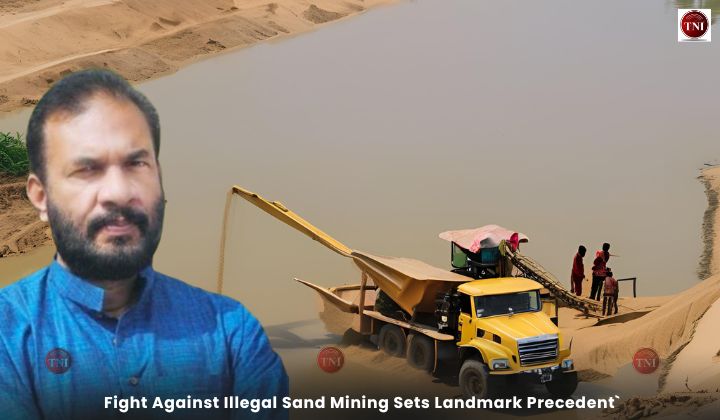Mayurbhanj, Odisha: In a resounding victory for environmental activism, Bibekananda Pattnaik, a prominent environmentalist from Odisha, and eminent environment lawyer Sankar Prasad Pani have set a landmark precedent in the fight against illegal sand mining. Their sustained efforts to expose flaws in environmental regulations have culminated in a historic judgment by the National Green Tribunal (NGT), reshaping the landscape of environmental governance in India.
The Case That Redefined Sand Mining Laws
The legal battle began on April 22, 2022, when Pattnaik filed a petition in the Eastern Zone Bench of the NGT, challenging the Odisha government’s auction of sand quarries based on an interim District Survey Report (DSR). He argued that the lack of a finalized DSR facilitated illegal sand mining, leading to severe environmental degradation and significant revenue losses for the state.
Responding to this plea, the NGT issued its first directive on August 26, 2022, ordering authorities to finalize the DSR through the State Environment Impact Assessment Authority (SEIAA). However, despite this directive, the mining department floated another tender for sand mining at Budhabalang Sand Bed-1 in Betnoti Tahsil, Mayurbhanj district.
Undeterred, Pattnaik raised the matter again, filing a second petition. On August 8, 2024, the NGT Eastern Zone Bench, led by judicial member B. Amit Sthalekar and expert member Arun Kumar Verma, prohibited all sand mining activities in the district under the interim DSR until further notice.
The final hearing on January 10, 2025, resulted in a landmark ruling: no sand mining would be allowed in Mayurbhanj district until a proper DSR was finalized, reviewed by the State Level Expert Appraisal Committee (SEAC), and approved by the SEIAA. This judgment has been lauded nationwide as a benchmark in environmental law, highlighting the necessity of robust environmental assessments to prevent illegal activities and preserve natural resources.
Support Independent Journalism? Keep us live.
A Pioneer in Forest Conservation
Bibekananda Pattnaik’s influence extends beyond courtroom victories. A tireless advocate for forest conservation, Pattnaik has played a pivotal role in empowering forest communities in the Similipal Tiger Reserve and surrounding areas. In 2004, he launched the “Jungle Rakshya Bandhan” program, a grassroots initiative that unites communities to protect and sustainably manage forest resources. This program has strengthened conservation efforts in Odisha and serves as a model for similar movements across India.
Balancing Environmental Protection and Development
While the NGT’s orders have garnered widespread acclaim, they have also sparked discussions about the balance between environmental conservation and development. The suspension of sand mining in Mayurbhanj has reportedly slowed down some construction projects. However, experts argue that enforcing environmental compliance is crucial for long-term ecological sustainability and safeguarding ecosystems.
Pattnaik’s relentless activism underscores the importance of grassroots efforts in driving systemic change. His work has spotlighted Odisha’s environmental challenges, inspiring countless others to join the fight for ecological justice.
A Legacy of Change
Bibekananda Pattnaik’s battle against illegal sand mining is more than a legal triumph; it is a testament to the power of individual activism. By holding authorities accountable and championing sustainable development, Pattnaik has created a roadmap for future environmentalists. His legacy is a clarion call for the protection of natural resources and the pursuit of ecological justice in India.


Comments are closed.